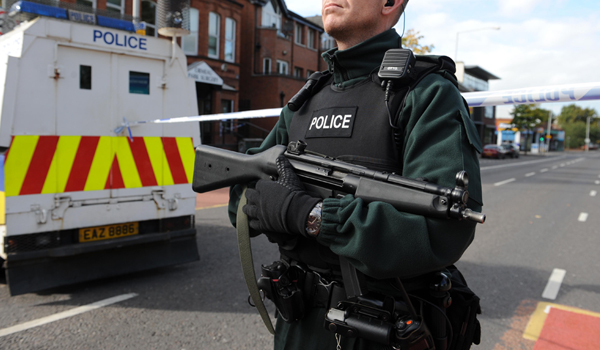PSNI praised for high standard of investigations despite ‘difficult operating environment’
The high standard of crime investigations has made Northern Ireland one of the safest places in the UK despite “a unique and difficult operating environment”, according to His Majesty’s Inspectorate of Constabulary and Fire and Rescue Services (HMICFRS).
Its latest report rated the Police Service of Northern Ireland (PSNI) ‘good’ at investigating crime.
His Majesty’s Inspector of Constabulary Lee Freeman KPM said the PSNI’s crime outcome rates for victims compare favourably with those in England and Wales.
“Northern Ireland is also statistically one of the safest places to live in the UK. One reason for this is the high standard of investigations, particularly for the most serious crimes,” he said.
Inspectors reviewed 80 crime file reports and found that most were effectively investigated by appropriately skilled investigators and reasonable opportunities to gather evidence were taken in nearly every case;
In addition, few investigations were delayed and, in every case, arrests were made at the earliest opportunity.
The PSNI was also rated ‘good’ at detecting and dealing with misogynistic and predatory behaviour, an area that has not previously been graded by HMICFRS.
“My judgment is based on two criteria,” said Mr Freeman. “Firstly, how well the PSNI compared to the findings in our thematic inspection of vetting, misconduct and misogyny in the police service in England and Wales. And secondly, on the processes and the service’s determination to stamp out this type of behaviour.”
However, there were other areas, such as protecting vulnerable people, and strategic planning, organisational management and value for money, where improvements could be made.
A service management statement would also help the PSNI understand demand, said inspectors.
“I am pleased with the performance of the PSNI in keeping people safe and reducing crime, although it needs to improve in some areas to provide a consistently good service,” said Mr Freeman.
“[However], I recognise that, unless its short-term funding challenges are resolved, it will be difficult for the service to make the improvements we have identified as necessary.”
Mr Freeman said the Northern Ireland context presents “a unique and difficult operating environment”.
“We recognise that the PSNI operates in a context that is unique within the UK,” he said. “The service polices in the shadow of a ‘severe’ terrorist threat, alongside the presence of criminality and community control from armed paramilitary crime gangs. And it has limited routine access to mutual aid support from elsewhere in the UK.
“Unlike its counterparts in England and Wales, the PSNI has, in recent years, received annual funding settlements, and it has no ability to hold reserves. This makes longer-term strategic planning difficult. And the predicted budget provision is expected to get worse.”
In the year ending March 31, 2023, the police budget shortfall was £80 million. In order to meet its budget, the service removed £40 million from non-pay costs, received additional funding late in the year of £30 million and made £10 million savings from headcount by cutting 424 posts (police personnel) – a reduction of nearly six per cent. Police officer numbers have fallen to 6,699, the lowest since the service was formed.
“The budget settlement for this financial year creates a gap in the region of £120 million from the resource requirement,” said Mr Freeman. “Planning assumptions see officer numbers falling to around 6,000 by March 2025. This reduction is in sharp contrast to the growth of police numbers in England and Wales by 20,000 officers under the Police Uplift Programme.
“Although we make some critical comments about the service’s workforce planning, we acknowledge that this decrease in officer numbers is likely to have consequences.”
Mr Freeman said this would include:
- A significant reduction in neighbourhood policing patrol hours, meaning less visibility, problem-solving activity, engagement and reassurance for communities;
- A reduced number of detectives and less experienced detectives. This will limit capacity for the development of intelligence and proactive investigation of terrorism, organised crime and high-harm offences such as rape, sexual assault and domestic abuse; and
- Fewer specialist uniformed support officers will mean reduced capacity for proactive search operations, specialist resource deployment and less resilience to deal with significant public disorder.
Among the areas for improvement highlighted in the report was a need for the PSNI to improve its understanding of and response to child criminal exploitation
While the PSNI works well with other agencies to protect victims of child sexual exploitation (CSE), Mr Freeman said there remains a perception within the service that “the exploitation of children for a criminal purpose isn’t a significant issue in Northern Ireland”.
“This simply isn’t the case and, while there may be nuances to the criminal structures in Northern Ireland, more should be done to protect victims of CCE,” he said.
And while the PSNI has made some progress in understanding current and future demand, Mr Freeman said “more could be done”.
He added: “In England and Wales, forces are required to submit a force management statement to us. This document helps forces operate more efficiently and effectively. The PSNI isn’t required to complete such a document.
“A service management statement would be an effective way of making sure the service fully understands its demand and would allow the service to demonstrate how it provides value for money.
“We urge the PSNI to adopt the best practice used by forces in England and Wales, and continue its plans to develop a service management statement.”


